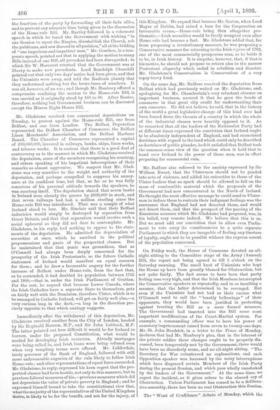Immediately after the withdeawal of this deputation, Mr. Gladstone received
another from the City of London, headed by Sir Reginald Hanson, M.P., and Sir John Lubbock, M.P. The latter pointed out how difficult it would be for Ireland to borrow, under the proposed Constitution, what would be needed for developing Irish resources. Already mortgages were being called in, and Irish loans were being refused even when very tempting terms were offered. Mr. Lidderdale, lately governor of the Bank of England, followed with still more unfavourable auguries of the ruin likely to follow Irish Home-rule; and other representations of equal force succeeded. Mr. Gladstone, in reply, expressed his keen regret that the pro- pertied classes had been hostile, not only to this measure, but to previous Liberal measures of his,—previous measures which did not depreciate the value of private poverty in England ; and he expressed himself bound to take the constitutional view that, what the majority of the representatives of the United Kingdom desire, is likely to be for the benefit, and not for the injury, of this Kingdom. He argued that because Mr. Sexton, when Lord Mayor of Dublin, had raised a loan for the Corporation on favourable terms,—Home-rule being then altogether pro- blematic,—Irish securities would be freely accepted even after Home-rule had become a fact. Mr. Gladstone added that, far from proposing a revolutionary measure, he was proposing a Conservative measure for returning to the Irish regime of 1782, one of the most commercially prosperous eras, as he holds it to be, in Irish history. It is singular, however, that, if that is his motive, he should not propose to return also to the narrow Protestant oligarchy which ended in rebellion and disaster. Mr. Gladstone's Conservatism is Conservatism of a very topsy-turvy kind.


































 Previous page
Previous page